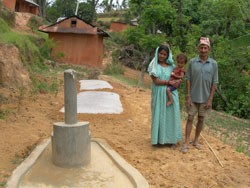
Bhim Bahadur, a poor farmer in the rural Kaski district of Nepal, had given up hope that his life would ever improve. The yield from his small piece of land earned him so meager an income that he could not support his family of eight. His annual income amounted to just $57.
Bahadur’s story is not uncommon. In fact, 80 percent of Nepalese are dependant on farming and forest products for their livelihoods. As population pressures grow, more families struggle to produce sufficient food. Already 40 percent of the population lives below the poverty line and suffers from “hungry seasons” and even severe droughts that can last for up to 3 months each year.
In response, USAID is working to raise the income of small farmers through improved access to water and market development. The project’s goal is to increase annual household crop sales from an average $60 to $120 to over $150. It is targeting 30,000 households across seven districts in western and mid-western regions of Nepal. To improve access to water, USAID helped small farmers in these districts install over 26,230 micro-irrigation systems in 2004 and 2005. In addition, USAID helped farmers form associations that bring member farmers important benefits, like access to bigger markets and help with farming technology. Currently the program is working with 1,512 farmers’ groups. With each group consisting of about 15-20 members, they represent the interests of 27,000 households.
A case in point is Mr. Bhim Bahadur, who joined a USAID-assisted farming group in January 2005. He started growing cucumbers using drip irrigation technology installed on the group’s farmland. In a short time, he doubled his earnings, and even grew enough to bring some home to his family. His success encouraged him to install a drip irrigation system on his own land, which he is developing to grow tomatoes and vegetables.
With USAID’s support, Bhim Bahadur and other Nepalese farmers look forward to a more prosperous future for their families and a higher quality of life.







Comment
Make a general inquiry or suggest an improvement.